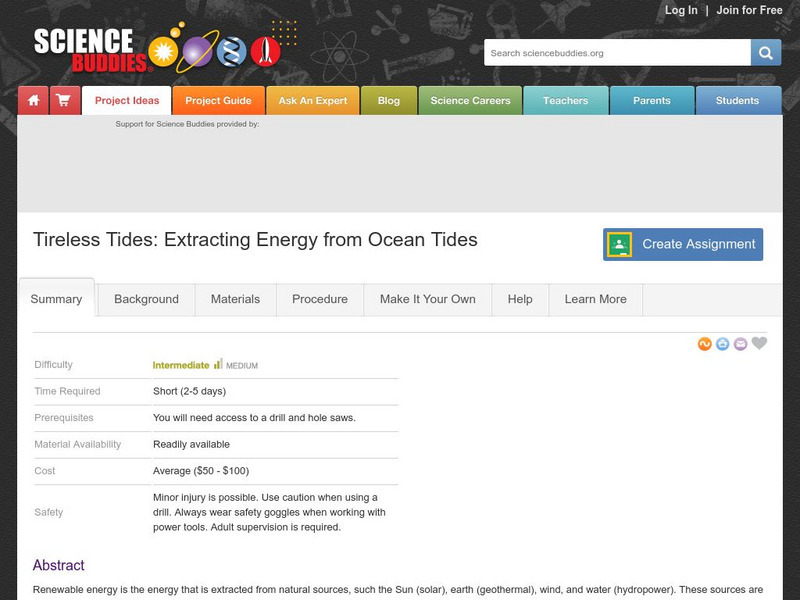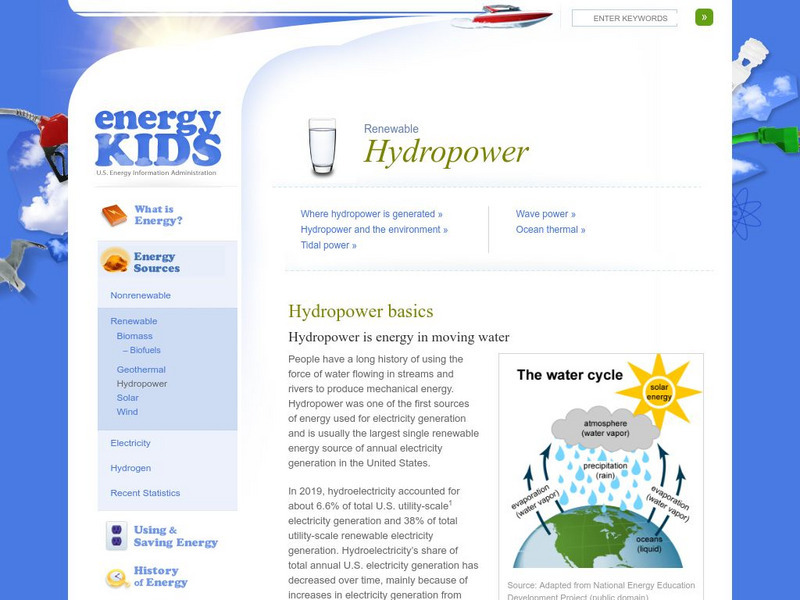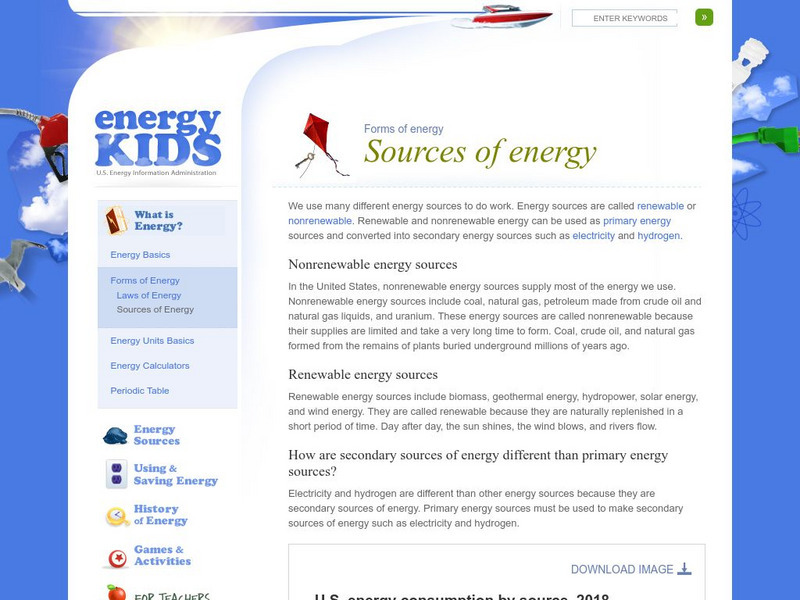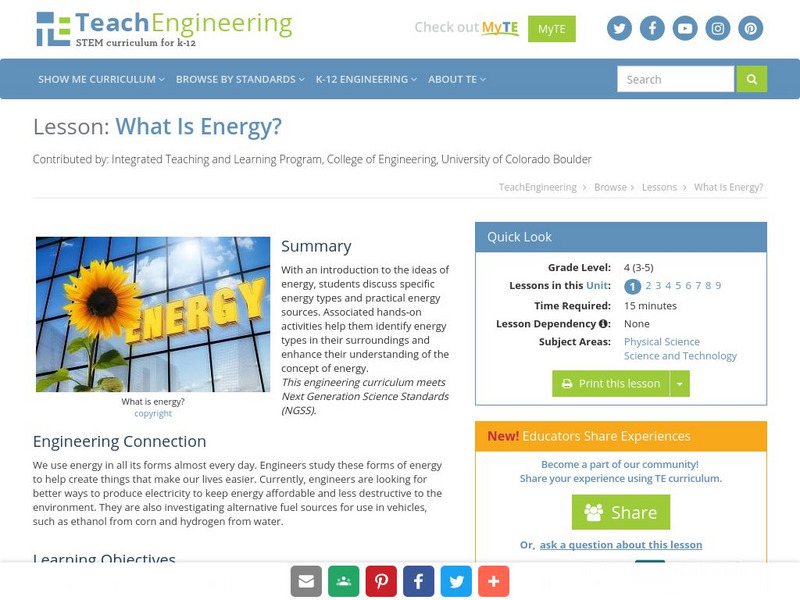Science Buddies
Science Buddies: Tireless Tides: Extracting Energy From Ocean Tides
Renewable energy is the energy that is extracted from natural sources, such the Sun (solar), earth (geothermal), wind, and water (hydropower). These sources are renewable because they can be replenished by the same natural sources within...
National Geographic
National Geographic: Encyclopedic Entry: Non Renewable Energy
A good primer on non-renewable energy sources. Covers the overall advantages and disadvantages, and discusses the different types and their pros and cons. Includes a slideshow with captions.
Other
Pembina Institute: Renewable Energy
Pembina Institute, a well respected Canadian research organization, has posted a variety of reports on renewable energy and energy efficiency here. Many of them respond to or make recommendations on federal and provincial government...
US Energy Information Administration
U.s. Eia Energy Kids: Hydropower: Energy From Moving Water
Of the renewable energy sources that generate electricity, hydropower is the most often used. Learn other interesting facts about hydropower as the pictorial illustrations bring the information to life.
American Geosciences Institute
American Geosciences Institute: Energy
Seven hands-on lessons module where students learn about energy. These inquiry-based explorations investigate where energy resources come from and how they are converted into electricity, how fossil fuels form, the importance of...
Other
Texas Comptroller of Public Accounts: The Energy Report: Ocean Power [Pdf]
Chapter 20 of a report on the energy industry in Texas. It looks at power generated from the ocean, its history, and uses. This is a source that has been minimally developed in Texas and is unlikely to develop in the near future. It...
Other
Texas Comptroller of Public Accounts: The Energy Report: Solar Energy [Pdf]
Chapter 10 of a report on the energy industry in Texas. It examines solar energy, its history, and how it is used. The solar power industry in Texas is described, its economic importance, methods of producing it, and how it is...
Other
Texas Comptroller of Public Accounts: The Energy Report: Geothermal [Pdf]
Chapter 21 of a report on the energy industry in Texas. It looks at geothermal energy, its history, and uses. The economic impact of geothermal energy in Texas is described, and its production, transmission, and availability. Also looks...
Scholastic
Scholastic: Study Jams! Science: Energy, Light and Sound: Renewable Fuels
A slideshow and a short quiz on the different types of renewable energy sources.
US Department of Energy
U.s. Department of Energy: Energy Basics: Renewable Energy: Solar Energy
Find out about renewable energy resources using solar energy technologies. Learn about the use of photovoltaic cells and the capture of the sun's energy.
Other
Rew: Us Energy Department Funds Low Carbon Jet Fuel Demonstration Plant
An approval from the U.S. Energy Department will financially allow further development and testing of low-carbon fuel.
US Department of Energy
U.s. Department of Energy: Geothermal Technologies: Enhanced Geothermal System
Through both an interactive animation and a short video, learn about the enhanced geothermal system as a means to utilize the Earth's heat as an energy source for our electricity needs.
NASA
Nasa: Climate Kids: Gallery of Energy
A collection of photographs highlighting alternative energy sources from fields of wind farms to towers of solar panels.
Read Works
Read Works: Electricity & Energy Energy
[Free Registration/Login Required] An informational text about energy. A question sheet is available to help students build skills in reading comprehension.
US Energy Information Administration
U.s. Eia Energy Kids: Timelines: Geothermal
Timeline of key milestones in the use of geothermal as a source of energy, starting with the first geothermal power plant built in Italy, in 1904.
Science Education Resource Center at Carleton College
Serc: Energy Gallery Walk
A cooperative learning activity using the Gallery Walk Strategy to enrich student understanding of the complex nature of solving our nation's energy needs.
US Energy Information Administration
U.s. Eia Energy Kids: Forms of Energy: Sources
Article explains what is meant by renewable and nonrenewable sources of energy.
ClassFlow
Class Flow: Sources of Energy
[Free Registration/Login Required] In this flipchart, students are introduced to the different sources of energy produced on earth. Students will learn the names of different energy sources, the mechanisms of how each works along with...
Energy for Sustainable Development
Esd Bulgaria: Kids & Energy: Electricity
Electricity is the flow of electrical power or charge. It is a secondary energy source which means that we get it from the conversion of other sources of energy, like coal, natural gas, oil, nuclear power and other natural sources, which...
E-learning for Kids
E Learning for Kids: Science: Cayman Islands: What Is Energy Conservation?
Renewable and nonrenewable energy sources are described, different types of energy, and how energy can be conserved.
E-learning for Kids
E Learning for Kids: Scotland: What Is the Difference Between Renewable and Nonrenewable Resources?
Looks at types of natural resources that can be used for energy, and the difference between renewable and nonrenewable energy sources.
US Energy Information Administration
U.s. Eia Energy Kids: Energy Basics
Learn about the definition of energy, the forms that it comes in, and the difference between renewable and nonrenewable sources.
US Department of Energy
U.s. Department of Energy: Energy Sources: Solar
The U.S. Department of Energy provides links pertaining to solar energy. Understand the current technologies and issues with this resource.
TeachEngineering
Teach Engineering: What Is Energy?
With an introduction to the ideas of energy, students discuss specific types of energy and the practical sources of energy. Hands-on activities help them identify types of energy in their surroundings and enhance their understanding of...
Other popular searches
- Renewable Energy Resources
- Renewable Energy Sources
- Non Renewable Energy Sources
- Non Renewable Energy Sources







![Texas Comptroller of Public Accounts: The Energy Report: Ocean Power [Pdf] eBook Texas Comptroller of Public Accounts: The Energy Report: Ocean Power [Pdf] eBook](https://d15y2dacu3jp90.cloudfront.net/images/attachment_defaults/resource/large/FPO-knovation.png)













